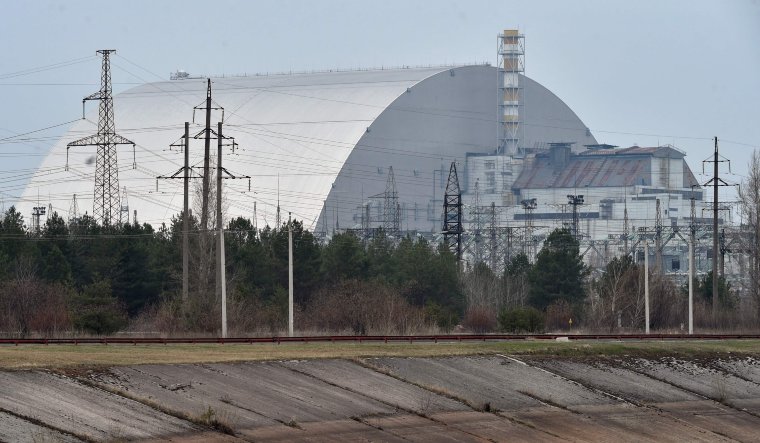"Nuclear authorities have to keep on alert," he said
Web Desk Updated: April 27, 2022

A file picture of the dome built over the sarcophagus covering the destroyed fourth reactor of the Chernobyl plant | AFP
In the ongoing Ukraine war, one region that the Russians captured early was Chernobyl, the site of the world's worst nuclear disaster 36 years before. The plant was damaged in the battle that ensued in the region. Now, the head of the International Atomic Energy Agency has stated that the Russian troops risked causing an accident with their "very, very dangerous seizure" of the Chernobyl. IAEA Director-General Rafael Mariano Grossi said that while radiation levels are normal, "the situation is still not stable". "Nuclear authorities have to keep on alert," he said.
Russian troops moved into the radiation-contaminated Chernobyl exclusion zone in February on their way toward the Ukrainian capital. They withdrew late last month as Russia pulled its forces from areas near Kyiv and switched its focus to fighting in eastern Ukraine.
New satellite images indicate that Russian troops were exposed to dangerous levels of radiation during their stay for over five weeks at the contaminated area of the Chernobyl nuclear site. Although the levels are insufficient to cause sudden radiation poisoning, experts say they can increase the long-term risk of cancer.
Ukraine's state energy company Energoatom said that Russian troops who had occupied the nuclear station at Chernobyl may have been exposed to "significant doses" of radiation. The Chernobyl disaster of 1986 caused radioactive material to spread throughout the region. After the accident, people are not allowed to live or grow crops at the Red Forest, which is the most contaminated part of the Chernobyl exclusion zone. Even Chernobyl staff are banned from entering this area. A 30km area surrounding the nuclear plant is considered dangerous.
After the Russian forces left Chernobyl on March 31, there were reports on social media that its troops at Chernobyl had fallen ill when they stayed at the place and digging trenches on the site. The top layers of soil were removed as the Russian soldiers dug their trenches. and thus they came in contact with soil containing radioactive waste.
"The invaders did not dig anything on the territory of the plant itself, but the thick dust raised by equipment in transit, and the radiation particles in it, may very well have entered the bodies of Russian occupiers through the lungs," Valerіy Seyda, director of the nuclear power plant, said in a statement.
-Inputs from agencies
In the ongoing Ukraine war, one region that the Russians captured early was Chernobyl, the site of the world's worst nuclear disaster 36 years before. The plant was damaged in the battle that ensued in the region. Now, the head of the International Atomic Energy Agency has stated that the Russian troops risked causing an accident with their "very, very dangerous seizure" of the Chernobyl. IAEA Director-General Rafael Mariano Grossi said that while radiation levels are normal, "the situation is still not stable". "Nuclear authorities have to keep on alert," he said.
Russian troops moved into the radiation-contaminated Chernobyl exclusion zone in February on their way toward the Ukrainian capital. They withdrew late last month as Russia pulled its forces from areas near Kyiv and switched its focus to fighting in eastern Ukraine.
New satellite images indicate that Russian troops were exposed to dangerous levels of radiation during their stay for over five weeks at the contaminated area of the Chernobyl nuclear site. Although the levels are insufficient to cause sudden radiation poisoning, experts say they can increase the long-term risk of cancer.
Ukraine's state energy company Energoatom said that Russian troops who had occupied the nuclear station at Chernobyl may have been exposed to "significant doses" of radiation. The Chernobyl disaster of 1986 caused radioactive material to spread throughout the region. After the accident, people are not allowed to live or grow crops at the Red Forest, which is the most contaminated part of the Chernobyl exclusion zone. Even Chernobyl staff are banned from entering this area. A 30km area surrounding the nuclear plant is considered dangerous.
After the Russian forces left Chernobyl on March 31, there were reports on social media that its troops at Chernobyl had fallen ill when they stayed at the place and digging trenches on the site. The top layers of soil were removed as the Russian soldiers dug their trenches. and thus they came in contact with soil containing radioactive waste.
"The invaders did not dig anything on the territory of the plant itself, but the thick dust raised by equipment in transit, and the radiation particles in it, may very well have entered the bodies of Russian occupiers through the lungs," Valerіy Seyda, director of the nuclear power plant, said in a statement.
-Inputs from agencies
No comments:
Post a Comment